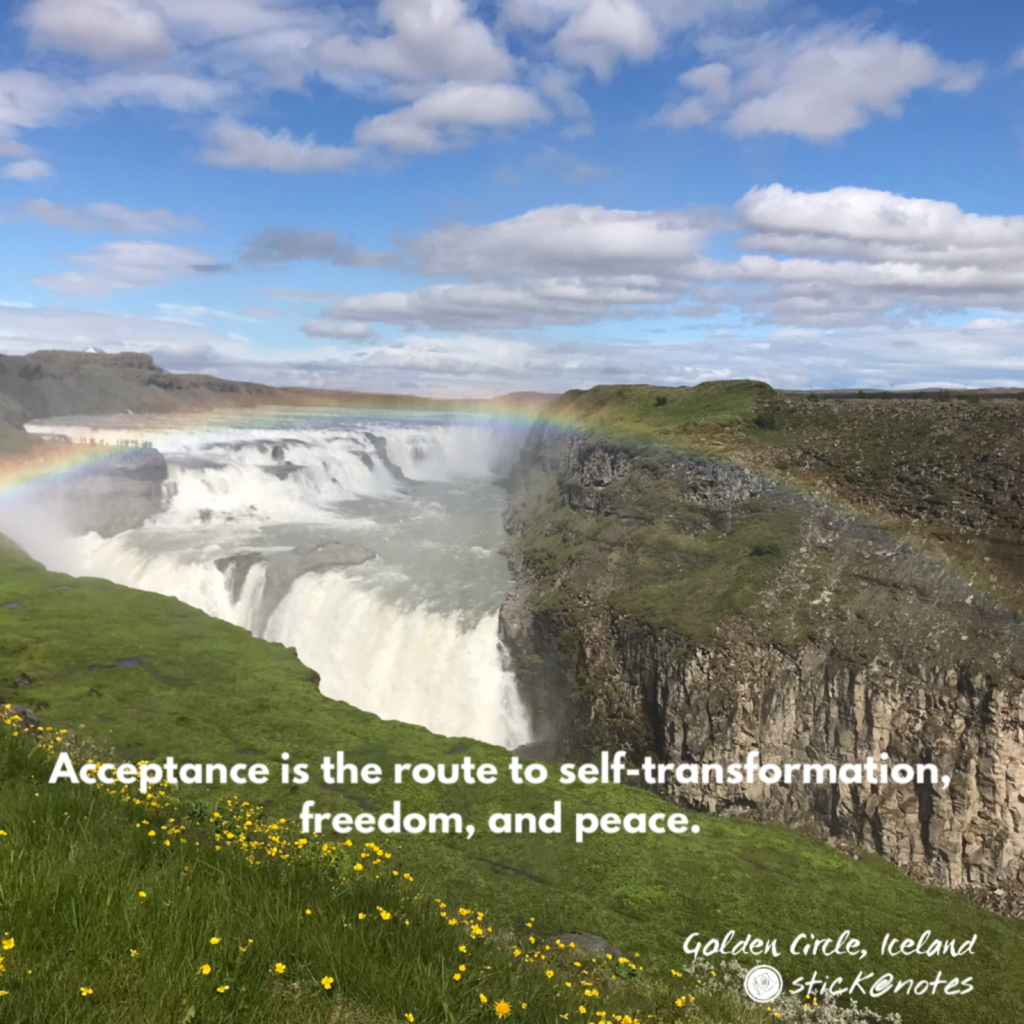-
The Power Of Acceptance
We all have certain desires and expectations; and they give us the motivation and energy to strive and reach our goals. In reality, however, many things in life are beyond our control. And unforeseeable circumstances can happen in a blink of an eye that can shatter our plans. What we desire and expect are not always what we get.
When we talk about the things that are beyond our control; whether it is about our “perceived” self image (that we are born with), where we come from, or unforeseen circumstances; resistance and denials often exacerbate the outcome. It creates frustration, defensiveness, resentment and other negative feeling. Without a doubt, our willingness to accept the uncontrollable have an impact on our emotional wellbeing.
The virtue of acceptance can be intricate in nature. Many misinterpret it as giving up too easily. Practicing acceptance is far from straightforward. It involves awareness, an open mind, patience, and prayers. This is how “Serenity Prayer”, written by the American theologian Reinhold Niebuhr, has helped and guided so many people, including myself, to cultivate better clarity on acceptance during life journey.
God, grant me the serenity to accept the things I cannot change, the courage to change the things I can, and the wisdom to know the difference.
Serenity PrayerSelf-Acceptance
There is always something we dislike about ourselves. We don’t like the image we see in the mirror; and wish we were taller, shorter, skinnier, and so on. We don’t see our own gifts but longing for those talents we see in others.
Some people have a hard time accepting who they are, the past or family status. They live in denials, disguising themselves by acting and pretending to be someone else.
Self-Acceptance is perhaps the most important first step toward self transformation, freedom and peace. When we accept both our strengths and weaknesses, without being defensive, we become more relaxed and content with ourselves. It provides a sense of clarity that, while we are blessed with our gifts, we need to work on our limitations by being open to new ideas, and take each experience as an opportunity to learn.
As a result, people who accept their strengths and weaknesses without resistance tend to have less ego. They naturally exercise other virtues like love and understanding, respect, and humility; all of which can help them do the right things and make the right choices during challenging life events.
Acceptance Of Others
The powerful outcome of self-acceptance is the ability to do the same for other people around us, especially family and friends. The trait of humility through self acceptance allows us to be more compassionate, less judgmental, and accept others’ strengths and limitations with respect.
In some instances, acceptance that involves someone else doesn’t mean that you approve what they do. It simply an act of acknowledgement of who they are; and an understanding that you cannot change others. Acceptance becomes the first step before “you” can make the next move.
You may decide to:
- Accept the problem that hurt you and let go of that someone else (like a manipulative or abusive person), or
- Accept how you feel, what bothers you, and learn to change “within” by practicing patience, respect, adaptability, love and understanding (usually when dealing with family members).
Parents who accept and celebrate each child as unique and special individual, for example, do not compare them with other children; they help their children realizing their strengths and support them through challenges.
Acceptance of Circumstances
While we look forward to certain changes in our life; like moving from high school to college, or getting that first job; some unforeseen changes can cause a lot of stress and turbulence. The secret to making the most out of change is that, first we must acknowledge and accept the circumstances presented before us with open arms. Once we accept, we tend to be calmer and have better clarity to approach the situations. Acceptance can free us from resistance, denials, worries and the urge to change the uncontrollable – the reason causing so many people feeling emotionally exhausted and frustrated.
Practice Acceptance
Just like many other virtues, learning acceptance is a lifelong process. With a clear understanding about acceptance and its impact on our emotional and psychological wellbeing, we react to life experience more consciously; and no longer waste our energy on resistance or denial. Most importantly, practicing this virtue opens up opportunities to exercise other virtues; such as humility, patience, respect, awareness, compassion, adaptability, love and understanding, to name a few. Acceptance is the ultimate route to self transformation, freedom, and peace.

-
Doing The Right Thing
Have you ever worked so hard to impress your boss, only to find that he/she dismissed what you did. And even criticized you for spending too much time on low priority job?
It certainly is upsetting when we choose to work hard to make ourselves look good, and not getting the responses we expect. Likewise, it is difficult to make choices when we are presented with two opposite forces.
There is nothing wrong when we occasionally expect acknowledgment or appreciation as an incentive to do better. Making choices due to fear of missing out (FOMO) or to gain others’ approval, however, often lead to stress and disappointment.
Everything we do in life is a choice. Those choices determine the kind of life that we are going to live. As a result, it is important to make good choices that are aligned with our values and life purpose. In other words, instead of doing something to follow the crowd, we should make choices that feel good, and feel right.
How do we know if we do the right thing?
Our conscience often guides us to know the difference between right and wrong. Doing the right thing also goes hand in hand with being true to our ethical values and principles.
To illustrate this, let’s look at a couple of examples. Let’s say your highest value is spending time with your family. Your boss offer you a promotion with good money but you have to be away from your family for extended period of time. You may crave for a better pay but you know that the money at this point is not worth going against your value, and doing the right thing is to say no to that offer.
Likewise, when you put transparency as one of your principles, you may find it stressful working for a company that has a culture of keeping employees in the dark. You can do the right thing proposing and strategizing more transparent communications, or move to another company that shares similar values.
Life is about making choices. Use your gifts, do your part, do the right thing, and don’t worry what everyone else is doing. And you will uncover the ability to make good choices in all aspects of life.

-
The Secret of Balance
We often hear that nothing is perfect; and it is not possible for a person to have it all. Bob is so successful in his career but his family is a mess. Katie is very smart and full of energy. She works more than 60 hours a week but her mental and physical health start to go downhill when she is in the late forties. We start to think that it is normal to be that way: we can’t have it all.
If we look into the above scenarios more carefully, the common denominator for Bob and Katie is that they spend too much focus in one aspect of life. And eventually, they experience negative consequences in the other areas of their life.
To illustrate the negative consequences of the extremes we need to look into all aspects of our life more carefully.
The Four Aspects of Life
There are four most important aspects of life where each one of them is tightly interconnected with the others: Self and spiritual, health (mind and body), family and friends, work and finance. Putting too much time and focus in one area is a surefire way to create problems in the other three. When we have all four aspects of life at a balanced state, we have reached a state where we have it all because our life is in harmony.
Self And Spiritual – The Foundation
In the midst of our busy life, we tend to put our “self and spiritual” wellbeing at a lower priority level. In reality, this aspect of life is the most important foundation to build a balance life. The way we understand and see our “self” determines how we approach the other aspects of life. Contented self is mindful, aware of feelings and thoughts that lead to happiness; and those that need changing within, and not without.
Giving time to self is essential for physical, emotional and mental health. It reduces stress, provides more positive energy and eagerness to work on the next tasks in front of you.
Setting aside “me” time each day can range from doing activities that you enjoy, such as praying, reading, listening to music, walking, to practicing mindfulness or meditating.
Practicing mindfulness, or self awareness, actually should be the priority of “me” time. It gives us the opportunity to build relationship with our inner self, and brings us to spiritual wellness.
The path to spiritual wellness allows us to connect the dots between experience, challenge, and life purpose; and helps us find deeper meaning of events in life. It also allows us to feel more connected to a higher power and other creations around us. We have more clarity when it comes to making everyday choices, and our actions are more aligned to our ethical values and principles.
The more we become aware of our inner self, the clearer to see what needs changing and improvement within. As a result, practicing self awareness helps us reaching and maintaining balance in all aspects of life.
The Interconnections
The interconnections among the four aspects of life is so tight that when we practice self awareness, we can identify any imbalances before it goes too far. Below are a couple of examples illustrating the consequences of imbalances touching the four aspects of life.
When we put too much focus on work and money, we become too exhausted to spend time with family and friends, not to mention the negative effects on our physical and emotional health due to stress, lack of sleep or exercise. On the other hand, lack of focus on career development prevents us from cultivating successful career, which may impact financial stability and self confidence.
Spending too much time caring for others but not enough “me” time can lead to mental and physical exhaustion. Likewise, having too much “me” time without doing something productive and purposeful tend to make us feel empty and unfulfilled.
Life is a journey to grow and be a better version of ourselves. Learning to attain balance is a part of this growth. Keeping all aspects of life in balance is the key to live this life to the fullest. It is the key to having it all. Strive to find a balance and we will live in harmony.

-
Giving Respect
We often hear the word respect when we grow up. Our parents reminded us that we have to respect our teachers and older generations. Many also use this word as a demand, like “I am the boss! They must respect me!”.
The word respect is most used and understood by many when they feel deep admiration of someone because of his/her abilities, qualities, or achievements.
There is nothing wrong, and it is easy to respect others who have success stories. But what about everyone else who is still growing and finding their way in the society?
The most important aspect of respect is often forgotten, or less instilled in our culture. That is, giving respect to others regardless of their status and traditions; to those who choose different schools, degrees, professions and come from different background.
The lacking of this type of respect is one of the reasons there are so many relationship problems at work and at home.
At workplace, we often hear comment like: “those people from the other departments don’t know what they are doing!”. Many also feel that certain jobs are not as important as their own job. Lack of respect for each other create stress at workplace, not to mention lost of productivity!
At home, it is easy to criticize or disrespect your family members who do or like something different from you. In addition, the lack of respect often lingers between two generations who have different views due to generation gap.
Give Respect, Earn Respect
Giving respect is an act of acceptance; it comes from our thoughtfulness for the feelings, wishes, rights, or traditions of others, no matter who they are, what they have, or where they come from. Equally important, giving respect allows us to see and appreciate others’ gifts, talents, abilities and contributions. It is no surprise that successful leaders who give respect to each of the team member are able to utilize each individual’s talent(s) to the fullest, build a strong teamwork, and in return, earn full respect and loyalty from the entire team.
Give Respect, Less Judgement
Our nature often judges instead of respecting others because of their differences. The good news is, we can practice and consciously make an effort to look at others’ differences as something to respect. When we choose to give respect and treat each person as unique and special individual, we find that there is less judgement in our relationships.
This kind of respect in fact uncovers one of the secrets of happy, healthy, and lasting relationships. Giving respect to others no matter their achievement status is the most considerate and loving gesture we can give.

